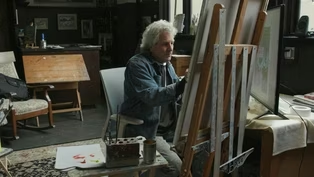
New Sheriff in Town
Clip: Season 4 Episode 8 | 9m 38sVideo has Closed Captions
The new sheriff in Bristol County wants to run what he calls a more modern jail system.
Bristol County Sheriff Paul Heroux wants to prioritize rehabilitating inmates. Heroux says every inmate should leave the jail with a job, health care and a place to live. Rhode Island PBS Weekly’s Michelle San Miguel talks with the Massachusetts sheriff about his priorities in office, including how to lower the suicide rate among inmates and why he wants to close one of the county jails.
Problems playing video? | Closed Captioning Feedback
Problems playing video? | Closed Captioning Feedback
Rhode Island PBS Weekly is a local public television program presented by Ocean State Media

New Sheriff in Town
Clip: Season 4 Episode 8 | 9m 38sVideo has Closed Captions
Bristol County Sheriff Paul Heroux wants to prioritize rehabilitating inmates. Heroux says every inmate should leave the jail with a job, health care and a place to live. Rhode Island PBS Weekly’s Michelle San Miguel talks with the Massachusetts sheriff about his priorities in office, including how to lower the suicide rate among inmates and why he wants to close one of the county jails.
Problems playing video? | Closed Captioning Feedback
How to Watch Rhode Island PBS Weekly
Rhode Island PBS Weekly is available to stream on pbs.org and the free PBS App, available on iPhone, Apple TV, Android TV, Android smartphones, Amazon Fire TV, Amazon Fire Tablet, Roku, Samsung Smart TV, and Vizio.
Providing Support for PBS.org
Learn Moreabout PBS online sponsorship- We begin tonight in Bristol County, Massachusetts, where for the first time in 25 years, there's a new sheriff in town.
- Paul Heroux, the former mayor of Attleboro, campaigned on running a department that's focused on rehabilitating inmates.
And he has some ambitious ideas about what that looks like.
Heroux wants every inmate to leave the jail with a job, health care, and a place to live.
To many of his detractors, that may seem like pie in the sky, but Heroux is optimistic he can prove them wrong.
- I have my own guiding principles.
Public service is not about those who serve.
It's about those who would be served.
Do more for others than you do for yourself.
- [Michelle] Paul Heroux, the new sheriff of Bristol County, has promised to run what he calls a more modern jail system.
He wants to prioritize rehabilitating inmates, but he knows he needs the support of his new colleagues to get it done.
- But then I also have guiding principles internally as well managing a jail.
Never make decisions alone, and always appreciate there's a reason for everything.
- [Michelle] Heroux isn't afraid to make big moves.
Soon after becoming sheriff, he announced a plan to close the Ash Street Jail in New Bedford.
One of his ideas involves moving the roughly 100 inmates who are here into the former immigration detention center in Dartmouth, known as the ICE facility.
- So, this is the other half of the ICE building, and this is, as you can see, it's just a big, open, dormitory-style room.
- [Michelle] This facility has been vacant for almost two years.
Heroux says moving the inmates who are at the Ash Street Jail over here would allow all of the inmates to be on the same campus.
- If we ever had a security incident, then you have more correctional officers on this campus, whereas Ash Street is a 15-minute drive from here.
So, it's just better to have the operation all in one place.
- [Michelle] Heroux estimates that converting the former ICE facility into individual cells would cost about $10 million.
- It's not the hardest of places.
It's just old.
- [Michelle] He's making his pitch to lawmakers.
- It's old.
We can't do as much programming here.
- [Michelle] Heroux says it's a move that would quickly pay for itself.
Meals would no longer need to be transported three times a day to New Bedford.
Plus, the Ash Street Jail is more than 10 times bigger than the ICE facility.
When you ran for sheriff, you would not commit to closing the Ash Street Jail.
Less than two weeks after becoming sheriff, you announced you have a plan to close it.
What changed in those two weeks?
Because that was a pretty quick decision.
- So when I ran, when I was running, I recognized that if I say I'm gonna close Ash Street... And I didn't have all the facts.
So, I didn't have all the facts, so I didn't want to commit to something.
So, what I have right now is a vision.
It's a hope, it's a plan, but it's not a decision because I can't make the decision alone.
I need the governor to be on board, and I need the state legislature to be on board with with that as well.
- [Michelle] The 46-year-old Democrat says he also wants to improve the services that inmates receive while they're incarcerated.
- So, we have 700 inmates.
And so every single inmate would know where they're gonna go for housing, health care, and a job after release.
And so that's a modern approach to discharge planning.
But while people are here, we're also offering as much treatment as we can for mental health issues, anger management, addiction services.
- You know you'll have people who hear this who say, "Sheriff, you really are making the jail "sound like a somewhat desirable place "for people who have nowhere else to go to end up."
- It's called a house of correction.
We should be correcting.
It's a department of correction at the state level.
We should be correcting.
- [Michelle] He wants case workers and employers to work with inmates to help them secure jobs upon their release.
But he needs the money and resources to do that.
And that could be a hard sell.
- I can't do this by myself.
The inmates have to also want this support.
And so we're gonna make it available to everybody who does.
But also, it doesn't stop there.
I also need the resources from the legislature to make this happen.
And I need the outside groups, the nonprofits, the third parties to also come into the jail system, develop those relationships with the inmates so when the inmates are released, they say, "I've got somebody who is gonna help me "get back on my feet on the outside."
- But is there another jail system somewhere in Massachusetts or somewhere in the country that's doing what you're talking about that you can point to and say, "They've done this successfully.
"We wanna model that"?
- I don't know of anywhere, but it doesn't mean they're not doing it.
- [Michelle] One month after Heroux defeated Thomas Hodgson, the sheriff who had the job for 25 years showed him around the jail.
- How are you today?
Nice to meet you.
- [Michelle] And introduced him to members of the sheriff's office.
- We had a really tough campaign.
We really beat each other up.
And that's what campaigns do.
Once the election was over, he was professional, I'd like to think I was professional, and the election was over.
And so we said, "Okay, now we have to do a transition."
And so he was very cordial, very polite.
He was always a gentleman.
I can see why a lot of people really liked him.
- [Michelle] Both men know there are serious issues facing the department.
Just one day after Heroux became sheriff, a 41-year-old inmate was found dead in his jail cell in an apparent suicide.
Since 2000, the sheriff's office says 29 inmates have taken their own lives.
- We always have to be appropriately self-critical.
And so we have to always say, "Where can we be better?
"How can we do better?"
And so that's what I'm gonna do is I'm gonna bring in a third party.
He's a nationally-renowned expert.
And so I want to bring him on board, have him look at our system, and then come back and say, "This is where your blind spot is.
"This is what you were missing."
- [Michelle] Heroux has a master's degree in criminology, and spent several years working for jail and prison systems in Philadelphia and Massachusetts.
But he admits his career path is unconventional.
Before becoming sheriff, he spent five years as the mayor of Attleboro, and also served as a Massachusetts state representative for five years.
- I don't know if there is a conventional path to politics.
When I was in undergrad, I studied psychology and neuroscience.
I wanted to do something with human behavior and the brain.
And I have a degree in psychology, a degree in neuroscience.
And so I was looking at going to medical school or doing a PhD in neuroscience or something like that.
But then September 11th happened.
- [Michelle] 15 of the 19 hijackers on September 11th were from Saudi Arabia.
Heroux wanted to learn more about them.
He lived there for six months in 2003 teaching English.
He remembers what it was like there after compounds were bombed.
- There were checkpoints brought up everywhere, and I was numerous times pulled over and subjected to searches.
And I've had a .50 cal gun mounted on top of a Humvee pointed at me before.
- Why?
- Because I was a white Westerner in Saudi Arabia.
Which was kind of foolish because the perpetrators of the compound attacks didn't share my profile.
But the security operation was not as professional.
- [Michelle] His fascination with non-Western cultures has taken him around the world, including a nine-day trip to North Korea when he was in graduate school.
It was an eye-opening experience, and left him resolved to make conditions better for inmates in the United States.
- There are some people here in the United States who when they say, "This is how a jail or prison should be run," they actually describe what's done in some of these other places.
And I remind them of that.
I say, "That's not who we are as a country."
- [Michelle] Heroux promised voters that if reelected, he wouldn't serve more than two six-year terms as sheriff.
When he leaves the office, he hopes the county jail has a strong record of rehabilitating inmates.
- So, some people say, "Well, why are you helping these people get a job?
"I have a hard time finding a job."
My response would be, I'm more concerned about the inmate who doesn't have a job upon release, who doesn't have housing upon release, who doesn't have drug treatment or mental health support, and like health care coverage upon release.
Those are the inmates, the ones that don't have that, those are the ones I'm worried about coming back.
(light music) (light music) (light music) (light music) (light music) (light music) (no audio) (no audio) (no audio)
Video has Closed Captions
Clip: S4 Ep8 | 8m 55s | Loved ones of victims find solace at Station Fire Memorial. (8m 55s)
Video has Closed Captions
Clip: S4 Ep8 | 9m 1s | Black artist Edward Bannister’s legacy at the Providence Art Club lives on 150 years later (9m 1s)
Providing Support for PBS.org
Learn Moreabout PBS online sponsorship
- News and Public Affairs

Top journalists deliver compelling original analysis of the hour's headlines.

- News and Public Affairs

FRONTLINE is investigative journalism that questions, explains and changes our world.












Support for PBS provided by:
Rhode Island PBS Weekly is a local public television program presented by Ocean State Media

